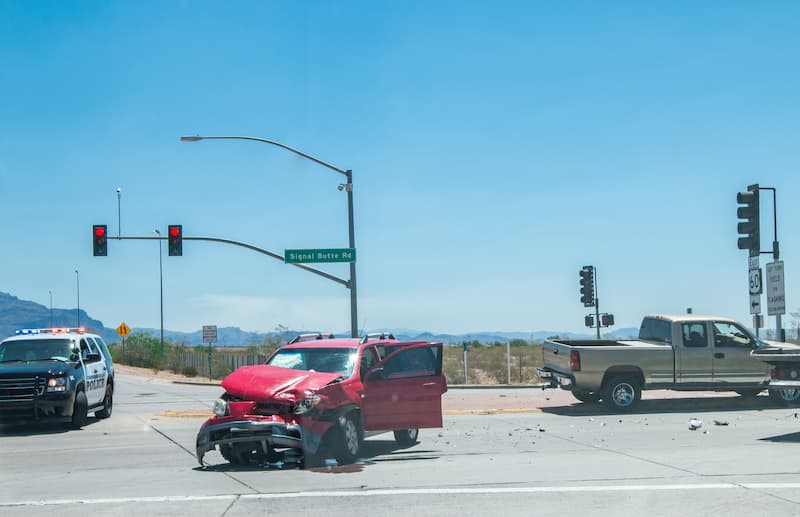How long do accidents stay on your insurance?
An at-fault accident typically affects car insurance rates for three to five years, with an average of three years. However, the length of time an accident affects rates depends on the insurer and the seriousness of the accident.
"The answer for that is more complicated than it used to be," says Zack Pope, agency manager at David Pope Insurance. "Some companies look at claims for 7 years. Mutua [insurance companies] wiill typically not accept a person if they've ever had a DUI. So, in general, an accident caused by a DUI will impact a person for the rest of their life. I also wouldn't be surprised if companies start evaluating the number of lifetime claims for an individual, depending on the laws of the state on if it is allowed."
Remember that the time an accident affects insurance rates isn’t necessarily the same as how long it stays on your driving record. Accidents might not appear on your driving record without associated violations, injuries or police involvement.
What is accident forgiveness, and how does it work?
Accident forgiveness is a policy add-on that ensures your rates won’t increase after your first at-fault accident. This means that even if you cause an accident, your insurance premiumThe payment required for an insurance policy to remain in force. Auto insurance premiums are quoted for either 6-month or annual policy periods. would not increase, and you would not lose any safe-driving discount you may receive. However, rates could rise after subsequent accidents depending on the insurance company.
Most insurers allow you to buy accident forgiveness coverage if you have a clean driving record, but some insurers offer it at no charge if you’ve been accident-free for a specified time.
So, how does accident forgiveness work? Let’s say you run a red light and cause an accident. Without accident forgiveness, your insurance premium would increase, and you would lose any safe-driving discount you may receive. However, if you have accident forgiveness, your rates won’t rise, and you will keep your discount.
Most insurers set limits on the number of accidents that can be forgiven within a specific time frame and on the coverage costs. However, these vary significantly by insurer.
Which companies offer accident forgiveness?
While many major auto insurers offer accident forgiveness, each company determines who is eligible and when the coverage is available. Insurers offering accident forgiveness include:
- Allstate
- GEICO
- Liberty Mutual
- Nationwide
- Progressive
- State Farm
- Travelers.
All insurers agree that a clean driving record is required to get accident forgiveness coverage, but the length of time required varies.
For example, drivers with Allstate insurance can buy two different tiers of accident forgiveness. The Gold membership forgives one accident every three years, and the Platinum tier allows an unlimited number of accidents.
On the other hand, GEICO offers free accident forgiveness if the driver is accident-free for five years. Then, one accident every three to five years is forgiven, depending on the state.
If you’re looking for accident forgiveness, consider the cost, what is forgiven and when you’re eligible for it. Consider accident forgiveness program features when shopping for coverage.
Although there is typically a surcharge for accident forgiveness, it’s less than the premium increases after an at-fault accident. This means that while you may have to pay for the accident forgiveness coverage, it could save you money in the long run if you have an at-fault accident.
How long does an at-fault accident stay on your insurance record?
Typically, an at-fault accident affects your insurance for three to five years. However, the length of time depends on the insurer. While some insurers only look at the last three years of your driving history, some look back further.
If you have at-fault accidents on your driving record, ask how long the insurer looks back when you shop for coverage. Finding an insurer that only considers a few years may help you get lower rates.
“Each insurance company offering personal auto insurance coverage in Virginia designs their rating program in compliance with the Code of Virginia. Consumers are encouraged to contact their insurance company or ask specific questions during the quoting process to learn more about how at-fault accidents or motor vehicle convictions may impact their insurance premium,” says Katha Treanor, communications manager, Virginia State Corporation Commission.
How to reduce your auto insurance premium after an accident
Although your car insurance rates will probably go up after an accident, there are things you can do to offset the additional costs.
Ways to lower car insurance rates after an accident include:
- Modify your policy. Raise your deductible and remove extra coverages you don’t need to get lower rates.
- Bundle your coverage. Most insurers offer a substantial discount for bundling multiple policies, such as home and auto.
- Attend a defensive driving course. Not only does a defensive driving course remove points from your license in some states, but you may also be eligible for an insurance discount for completing the class.
- Keep your driving record clean. While your insurance premium may increase after an accident, other infractions, such as speeding tickets or a DUI, will significantly raise rates. That’s especially true if you already have an accident on your record.
- Shop for coverage. Since each insurer weighs an accident differently when calculating rates, compare quotes from multiple insurers to find the cheapest rates available.
FAQ's
Can you remove an accident from your driving record?
An accident on your driving record with the DMV can’t be removed. Accidents don’t always appear on your driving record; as a general rule only accidents that involve violations, injuries or serious damage will appear on your driving history. Any accident where a claim is filed will appear on your insurance record.
Will my car insurance go up after an accident?
Your car insurance rates may increase after an accident if you’re at fault or file an insurance claimAn insurance claim is a request you make to your insurance company for coverage after your car is damaged or you have an accident. You can file a claim online, by phone, or in writing. against your insurer because the at-fault driver has little or no insurance. Your insurance rates won’t increase if no claim is filed unless a violation is associated with the accident.
Do all accidents affect insurance?
While at-fault accidents typically affect car insurance rates, you might not see a premium increase if you didn’t cause the accident, depending on your insurer. Additionally, drivers with accident forgiveness on their insurance policies may not see a rate increase after an accident.





